Posts by Christopher Lochhead
160 Radical Business Transformation | Clint Carnell, CEO Hydrafacial
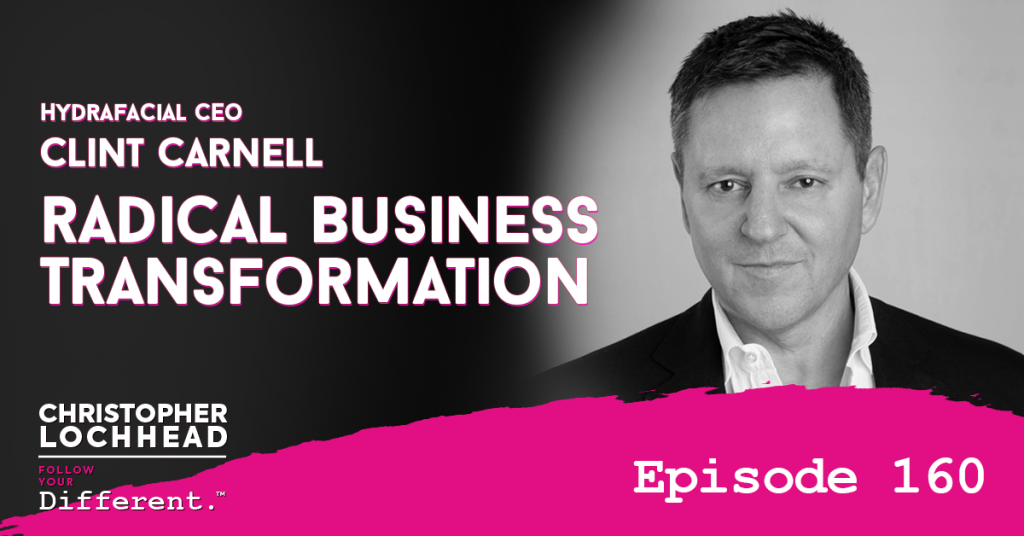
Podcast: Play in new window | Download (Duration: 56:41 — 38.9MB) | Embed
Subscribe: Apple Podcasts | Spotify | Pandora | RSS | More
Today, we have Clint Carnall, CEO of HydraFacial to share an extraordinary story of resilience, creativity, and action in a very short period of time. Clint’s company was one of the many companies that were amassing tens of millions of dollars in revenue, pre-pandemic. Now at zero revenues, they opted to go radically generous and thoughtfully aggressive.
This is a legendary and inspiring example of how an entrepreneurial team scaled to meet any challenge, even the greatest challenge frankly that any of us have faced in our lifetime.
The HydraFacial Ecosystem
HydraFacial, as Christopher described it “is a company that is a part medical procedure, part beauty spa-like experience.” Clint, on the other hand, describes their company as a company built on “partnership.” They are not a “or” company, rather an “and” company, considering hotels, spas, medical physicians as partners rather than competitors.
“Absolutely, no matter how good the painter they are, everybody needs a clean canvas. They think about HydraFacial like giving these physician med spas a clean canvas.” – Clint Carnell
Clint continues to describe how their company operates in an ecosystem of physicians and nurses and consumers spas, hotels, etc and how this business model helped them to drastically grow the business.
From Top-Tier to Zero Revenues
A few weeks ago, Clint’s company HydraFacial were on a growth tier, serving different regions worldwide. They were on their A-game until Covid-19 struck their business. Clint shares how he witnessed their markets in China, Japan, Taiwan, and the rest of the world shut down.
However, Clint shares why this is an exciting time to be creative and to brush it off and take off.
“I say it is a creative time. You know, it feels like an ambush. You are walking along and things are fine and then something hits you out of nowhere that you couldn’t expect. We are a little stunned. We have to brush ourselves off, were up and back, and ready to go.” – Clint Carnell
Finding Opportunities Amidst Crisis
Clint believes that good companies and executives, as well as creative entrepreneurs, have the capacity to make today as ‘creative times.’ CEOs all over the world have to make hard decisions, especially when you go from that kind of growth to almost zero revenue overnight.
“The things that made us good executing the way up were the same things that are serving us during these challenging times and so strategy, but more importantly, solid execution.” – Clint Carnell
To hear more about how a category queen company created three new lines of business in a matter of weeks after their core category collapsed to no fault of their own and for more information about Clint, download and listen to this episode.
Bio:
Clint was born in Anchorage Alaska but receives no royalties from the pipeline, thus he works for a living as our Chief Executive Officer.
He grew up in Washington State and chased a soccer ball well enough to attend Duke University on a scholarship where he received grades good enough to land jobs with the likes of Johnson & Johnson, Chiron, Gambro Healthcare and Bausch & Lomb.
He’s always been an entrepreneur starting in his early days when he would skip the school bus, buy jolly ranchers for a nickel and sell them for a quarter.
At thirty, he founded Charleston Renal Care, which was acquired by DaVita.
This gave him the ability to take a chance and join a VC backed company named Thermage, which went public, made acquisitions, and is now called Solta Medical.
In his very spare time, Clint and his wife are busy raising two kids in Park City, Utah. The family has lots of animals affectionately called “the farm”. His biggest fear is breaking all his bones trying to race his kids down the ski slope!
Links:
We hope you enjoyed this episode of Follow Your Different™! Christopher loves hearing from his listeners. Feel free to email him, connect on Facebook, Twitter, Instagram and subscribe on iTunes!
038 The Future Needs You
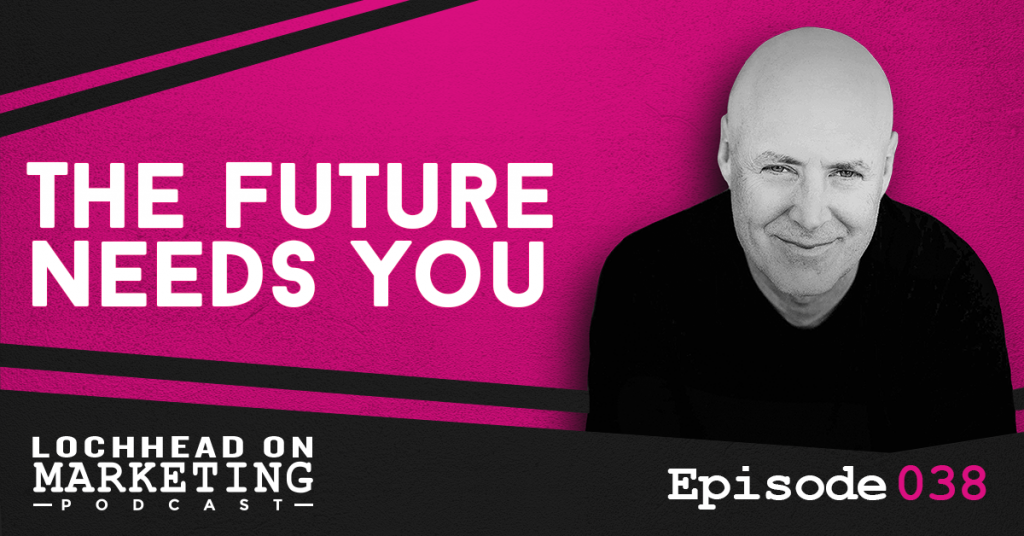
Podcast (lochheadonmarketing): Play in new window | Download (Duration: 7:11 — 4.9MB) | Embed
Subscribe: Apple Podcasts | Spotify | RSS | More
Today, let’s talk about why the future needs you and frankly, why the future needs some legendary marketing. Entrepreneurs, pay attention to this episode because the future needs you and your innovations to move the human race forward.
Going Back To How It Was
We hear a lot of discussion about how the business people plan to reopen businesses and how the entire workforce will get back to work. Christopher candidly gives his viewpoint for this: there is no going back to how it was before.
“I think frankly, there is nothing to go back to. It’s not about going back to work, it is about creating the future and I think that is where legendary marketing comes in.” – Christopher Lochhead
What Greatest Marketers Do
Christopher says the greatest marketers over time are the ones who move the world from the way it is now, to the way they want it to be. Further, he shares that legendary marketing is about making an exponential difference as opposed to creating an incremental change.
“I think we are witnessing the very beginning of the creation of a new future. Much is going to be different as we move forward. Work, the way we knew it, is different, Society, the way we knew it is different. I think people’s priorities are going to shift. I think what they value is going to shift. I think, therefore, what they are interested in buying is going to shift.” – Christopher Lochhead
The Power of Entrepreneurship
As a strong believer in the power of entrepreneurship and innovation to move the human race forward Christopher shares that most legendary marketers in the world have done exceptional work in doing exactly that.
“I think as we come out of this crisis there is a chance that we will begin to see the emergence of a whole new set of technologies, services, products and categories that design a more human future, frankly, a world that works for more of us, in a way that it never did before.” – Christopher Lochhead
To hear more about Why The Future Needs You and more information about Christopher, download and listen to this episode.
Bio:
Christopher Lochhead is a #1 Apple podcaster and #1 Amazon bestselling co-author of books: Niche Down and Play Bigger.
He has been an advisor to over 50 venture-backed startups; a former three-time Silicon Valley public company CMO and an entrepreneur.
Furthermore, he has been called “one of the best minds in marketing” by The Marketing Journal, a “Human Exclamation Point” by Fast Company, a “quasar” by NBA legend Bill Walton and “off-putting to some” by The Economist.
In addition, he served as a chief marketing officer of software juggernaut Mercury Interactive. Hewlett-Packard acquired the company in 2006, for $4.5 billion.
He also co-founded the marketing consulting firm LOCHHEAD; was the founding CMO of Internet consulting firm Scient, and served as head of marketing at the CRM software firm Vantive.
We hope you enjoyed this episode of Lochhead on Marketing™! Christopher loves hearing from his listeners. Feel free to email him, connect on Facebook, Twitter,Instagram and subscribe on iTunes! You may also subscribe to his newsletter,The Difference, for some amazing content.
159 Life Design w/ Rhonda Smith

Podcast: Play in new window | Download (Duration: 57:31 — 39.5MB) | Embed
Subscribe: Apple Podcasts | Spotify | Pandora | RSS | More
Today, a magical, mystical bestselling author and podcaster, Rhonda Smith, is with us today. She’s got a new book out called The Whole Method and a soul-affirming podcast called Cosmic Smith.
She’s incredibly open about what she calls “radical fullness.” We talk about why it’s ok, that not everyone is going to like you and why we want to experience everything in life and so much more.
Radical Fullness
Rhonda has overcome becoming a self-described “meth head” to transform her life. has been amazed at what little clean living can do for the body. She described how in the past two and a half years, she was battling a mind-blowing, brutal depression with suicidal tendencies. She copes with the whole situation by what she described as “understanding the darkness of her soul.”
“I finally remember how to be me, and allowed it. Radical acceptance, radical fullness.” – Rhonda Smith
She further shares the void inside every person, which is the center of our force. The dark is the feminine, the light is the masculine.
“Within the dark, and that void, that discomfort, that deep blackness of our soul, in that quiet space, when we learn how to sit there, that is when creation happens, just like the womb. It was learning how to be in that void of myself and not have to do or change anything and just be able to sit with it.” – Rhonda Smith
Dealing With Suffering
Christopher asks Rhonda to elaborate on the suffering or that void inside each person. He further shares that we have no choice once suffering “comes for us. We can resist it but we have to go through the fire in one way or another.
“The way I can best describe is like the thing people run from, the thing that keeps us in distraction, the things that keep us constantly seeking.” – Rhonda Smith
Teaching People Compassion
One of the biggest things Rhonda shares in this conversation is that one can’t teach someone to become empathetic or to have compassion. It is something that has to be learned through experience. Christopher and Rhonda exchange their point of view on why humanity has deemed homelessness and hunger as “okay.”
To know more about Rhonda and her views on designing your life, download and listen to this episode.
Bio:
Rhonda Smith was born and raised in picturesque Northern California.
She spends most of her time between the San Francisco Bay area and the Sierra Nevada mountains with her majestic little wiener dog, Saylor Love.
Rhonda shares her message on stage, as well as through podcasting, coaching, and her work with sacred plant medicine. She uses all of these modalities to support people in remembering the truth about who they are.
Rhonda believes that only when we embrace the darkest parts of ourselves, do we learn the lessons that lead to remembering and living our deepest truth.
The greatest work of our lives is being willing to stand naked with all of our masks removed. The current state of our planet (living earth) and humanity is a catalyst to understand the way we’ve been living isn’t working!
This was the spark that ignited Rhonda’s mission.
Her newest company, “The Expanded Hueman” is set up to answer the question “What comes next after personal development?” It’s an invitation for us all to stop the madness of endlessly seeking outside ourselves. Her book, The Whole Method, is about remembering how to journey back into ourselves and once there, discover everything we need.
It’s when you realize that who you are on the inside doesn’t quite match up to the persona you’ve created on the outside – You’ve done well, people look up to you, but deep inside there’s a niggle that something’s not right…
Something is missing. You suspect there’s more for you to learn.
Links:
We hope you enjoyed this episode of Follow Your Different™! Christopher loves hearing from his listeners. Feel free to email him, connect on Facebook, Twitter, Instagram and subscribe on iTunes!
158 Turn Barriers Into Windows w/ Marine Akshay Nanavati
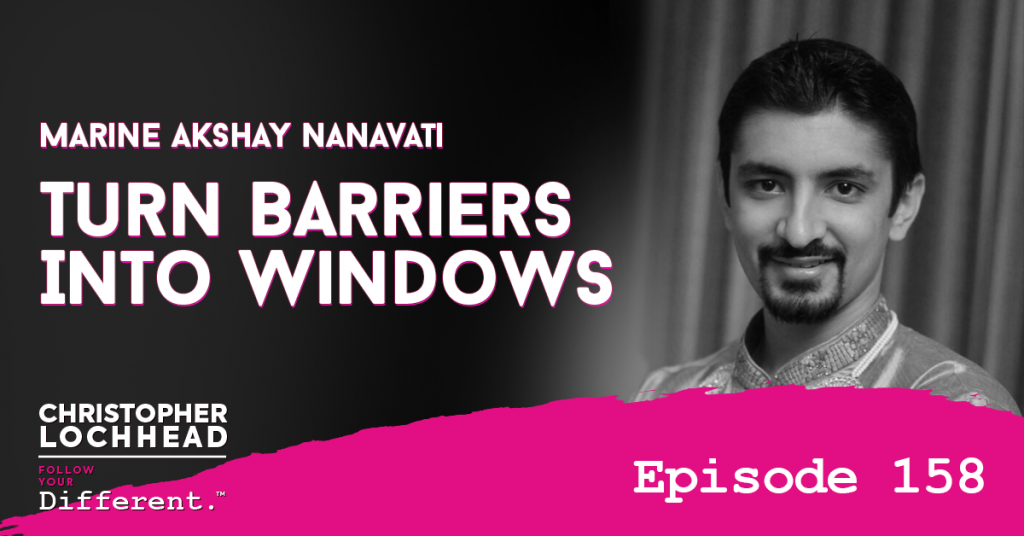
Podcast: Play in new window | Download (Duration: 1:04:25 — 44.2MB) | Embed
Subscribe: Apple Podcasts | Spotify | Pandora | RSS | More
Welcome to another amazing episode with Combat Veteran and US Marine Akshay Nanavati. He joined us at Episode 142, which was one of the top-rated episodes. Due to insistent public demand, he’s back. Akshay is a speaker, entrepreneur, ultra runner, non-profit founder, and best selling author.
Today, we specifically talk about dealing with life and moving forward in the face of fear and adversity. He of all people is powerfully equipped to empower those who are having a hard time dealing with C19. Listen carefully to Akshay’s ideas on how to change barriers with questions and more!
Solitude During C19
Akshay starts the conversation sharing about coins and medals with the iconic Marines raising a flag in the battle of Iwo Jima. He narrated how honored he is to be a part of the Marines who represents courage and valor in battles.
He further shares that he has been living in solitude prior to the Covid19 pandemic. He does some amazing activities to meditate and to practice stillness.
“I’m used to it and I don’t mind the solitude. I’ve trained in solitude in the sense like, I spent 7 days in pitch darkness, isolation, and silence, to confront my fear of stillness to master the experience of solitude but at the same time, as we briefly touch on I do have moments that I feel that sense of loss.” – Akshay Nanavati
Living in Paradox
Living in paradox, Akshay describes himself as someone who is social but likewise, enjoys his solitude. He shares how he cried himself to sleep while reading a book ISIS abducting a woman to become their sex slave.
“I read these intense books to remind me of the pain and suffering in the world and to stay focused on my mission. My solitude allows me to go into space that I would not be able to go to if somebody else was here.” – Akshay Nanavati
He further shares another activity that he does, which Christopher describes as an activity he wouldn’t do in a million years.
“When the world is intense, to me, that’s a time to dig deeper into it. I actually put a horrible death metal music. It’s not actually music, its noise, and I put on a strobe light. I meditate and practice stillness with it. It was very intense, but its a great practice to master stillness in the face of chaos.” – Akshay Nanavati
Overcoming Solitude in C19
A lot of people have actually improved communications with others during this crisis. A number of people utilized Zoom and social media to communicate with friends, family, and loved ones. Akshay shares that connection is important as humans are naturally tribal creatures.
“I think the problem is, what we’re doing right now, is the same as what we’re doing before, which is basically running away from pain, running away to having to confront ourselves and now we’re being forced into that world.” – Akshay Nanavati
To hear more about dealing with life and moving forward in the face of fear and adversity and to learn more about Akshay, download and listen to this episode.
Bio:
Akshay Nanavati (born October 15, 1984) is a United States Marine veteran, speaker, entrepreneur, ultra runner and author.
He served in Iraq during Operation Iraqi Freedom and was later diagnosed with post traumatic stress disorder. His book Fearvana was endorsed by the Dalai Lama and Jack Canfield.
Links:
We hope you enjoyed this episode of Follow Your Different™! Christopher loves hearing from his listeners. Feel free to email him, connect on Facebook, Twitter, Instagram and subscribe on iTunes!
157 How AI Can Work For Everyone w/ Girl Decoded Author, Rana el Kaliouby
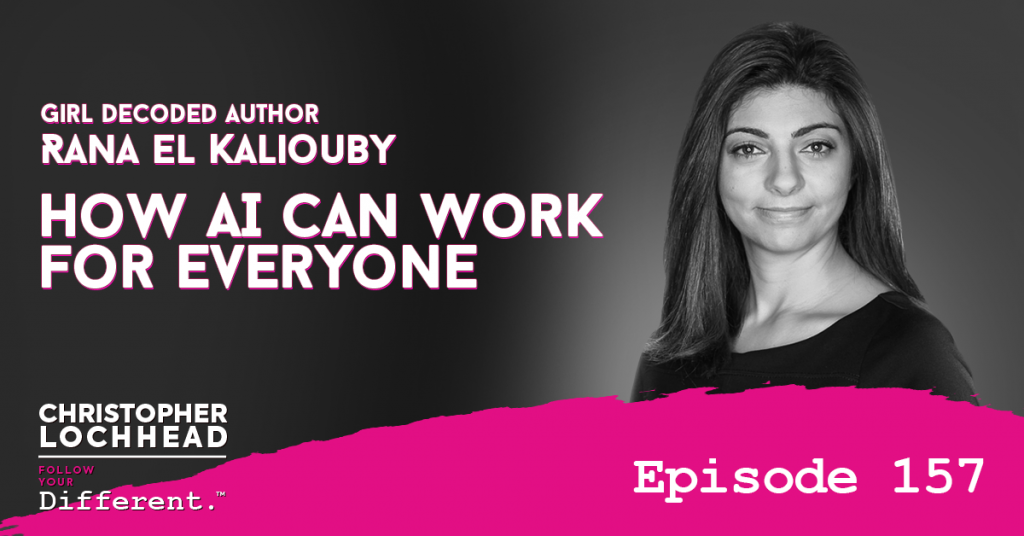
Podcast: Play in new window | Download (Duration: 1:15:25 — 51.8MB) | Embed
Subscribe: Apple Podcasts | Spotify | Pandora | RSS | More
Today, we have a riveting conversation with Dr. Rana el Kaliouby. She’s a tech / AI entrepreneur and the author of a brand new book out called Girl Decoded. Rana is the co-founder and CEO of Affectiva. Her work on A.I. is bleeding edge, particularly around human and emotional AI and the ethics of AI and more. This is a stunning, inspiring, real dialogue that you’ll surely love.
Top Woman in Tech
Rana el Kaliouby is a Muslim woman kicking butt in the American tech entrepreneur world. She holds a Ph.D. from the University of Cambridge and a Post Doctorate at MIT. She’s one of Fortune’s 40 Under 40 and Forbes says she’s one of America’s Top 50 Women in Tech.
She describes her success as a privilege for having supportive parents who made sure she and her siblings get a top-notch education.
“I grew up surrounded by strong women but it was always understood that your priority is the family and you do your work on the side, that was the context.” – Rana el Kaliouby
EI and AI, Counterintuitive
Christopher asks about how Rana speaks about Emotional intelligence in the AI world as it is oftentimes, counterintuitive. Rana shares how her endeavors connected the two.
“Even 25 years ago, I saw this pattern, with tech, it empowers us to communicate with more people. But I always felt there was something missing. We were communicating with more and more people so the quantity is there but the quality of the connection wasn’t quite there. It was almost like an illusion of a connection. – Rana el Kaliouby
Rana shares about her first time living abroad. She was newly married at the time and she found herself away from her family and then-husband who had to stay behind to run a software company. She realized that despite spending a lot of time with her laptop and mobile phone, she always felt alone due to a lack of intimacy of technology.
Importance of Emotional Intelligence
During Rana’s study abroad, technology served as the main portal of communication between her and her family. However, it fails to communicate the richness of her voice, intonation, facial expressions, and gestures. Non-verbal communications are lost she was chatting over text with her family.
“That just got me thinking, emotional intelligence and our emotions, in general, are so important in how we live our lives, how we make decisions, how we connect with one another, how we learn, how our memory gets encoded yet, in the digital universe, its devoid of all of that. That set me on the path of building technology that has AI and emotional intelligence and maybe even someday, empathy.” – Rana el Kaliouby
To hear more about Rana ’s views on human and emotional AI and the ethics of AI, download and listen to this episode.
Bio:
Rana is co-founder and CEO of Affectiva.
Having defined the category of Emotion AI, Rana is now pioneering Human Perception AI: technology that can understand all things human.
A passionate advocate for innovation, ethics in AI and diversity, Rana has been recognized on
Fortune’s 40 Under 40 and Forbes America’s Top 50 Women in Tech.
Rana is a World Economic Forum Young Global Leader.
She holds a PhD from the University of Cambridge and a Post Doctorate at MIT.
Links:
We hope you enjoyed this episode of Follow Your Different™! Christopher loves hearing from his listeners. Feel free to email him, connect on Facebook, Twitter, Instagram, and subscribe on iTunes!
156 Samsung Rising: Geoffrey Cain, Bestselling Author
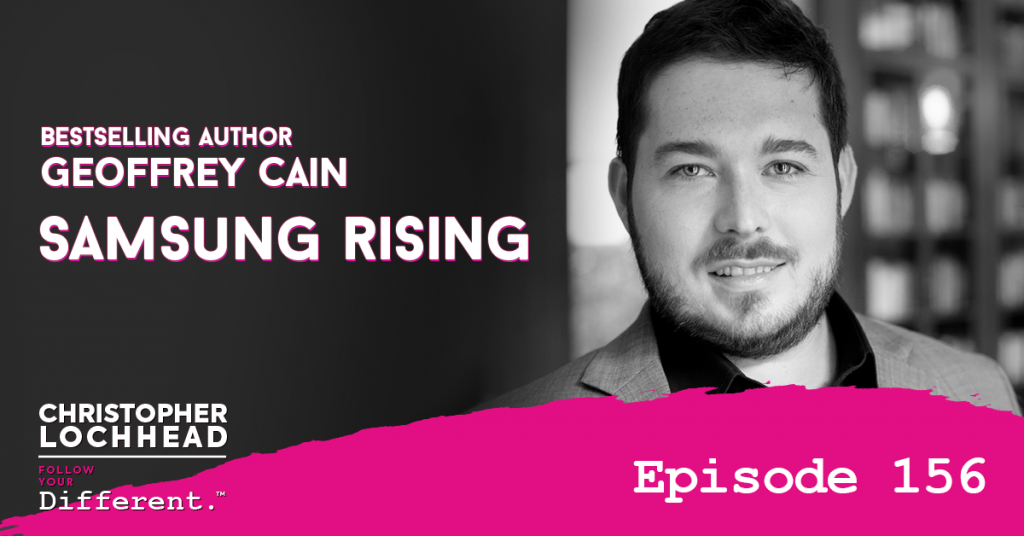
Podcast: Play in new window | Download (Duration: 1:53:29 — 77.9MB) | Embed
Subscribe: Apple Podcasts | Spotify | Pandora | RSS | More
We continue our run of legendary authors with best selling author of the brand new book Samsung Rising, Geoffrey Cain. He takes us into both South and North Korea, what it’s like to live in both places and how relatively small South Korea gained out-sized economic power. We also talk about how Samsung grew from a fish market to a mega-empirical, multi-national, with 300,000 employees. There’s a ton here you’ll find fascinating.
South Korea
Geoffrey gives a great visual description of both North and South Korea in this episode. He lived on and off in South Korea from 2009 to 2016 and have visited North Korea as well for two weeks as a reporter.
He further describes how South Koreans practice their right to assemble to petition about issues such as powers of major corporations, labor unions, and the like. He relates South Korea to the French who have massive protests, too.
“Korean democracy is quite young, it was only 1987 that Korea became a democracy. It wasn’t until many years later that it really became a full democracy. It was a corrupted democracy for a long time. The fascinating thing was the fact that I’m standing in the Square, and I could turn north and look north and I would realize that about 45 minutes or an hour drive away from me, is the border of North Korea.” – Geoffrey Cain
North Korea
On the border of South Korea lies what they call the DMZ or the Demilitarized Zone. It is one of the most heavily mined places on Earth. Former President Bill Clinton even visited and said: “its the scariest place on Earth.”
South Korea (SK) is described as orderly but with bustling cars and noise, he describes the DMZ in North Korea as barren land. There were no lush trees like in SK and the whole vibe of Pyongyang, the capital was similar to a dystopian sci-fi movie.
Miracle in Han River
The unexpected growth of South Korea is often called as the Miracle in Han River. The country was able to come out of nowhere and take on the world. This is what Geoffrey discussed in his book Samsung Rising.
“The story of this nation that has been overlooked in the past—it is small, it is seen as inconsequential, it is this little peninsula next to this major giant, China, smash right there with Japan, which is also a big power subject to all kinds of war and sufferings in the past—but somehow managed to become this powerhouse of technology and economy and industry and democracy.” – Geoffrey Cain
To hear more about Geoffrey’s views on China and Asia more broadly, the Coronavirus and the battle for worldwide AI supremacy, download and listen to this episode.
Bio:
Geoffrey Cain is an award-winning foreign correspondent, author, commentator, anthropologist, and scholar of East and Central Asia.
His first book, Samsung Rising: The Inside Story of the South Korea Giant That Set Out to Beat Apple and Conquer Tech, from a decade of his coverage of the world’s largest technology conglomerate, was published in March 2020 by Currency at Penguin Random House.
A former correspondent at The Economist, Cain is a regular commentator in The Wall Street Journal, Time, Foreign Policy,
The New Republic and The Nation, and a frequent guest on CNN, MSNBC, BBC and Bloomberg.
Cain writes about the ways that technology is upending our lives, communities, governments and businesses.
His work takes him to the world’s most authoritarian and far-off places, from inside North Korea to the trans-Siberian railway across Russia, from investigations into genocide in Cambodia to experiments in technological surveillance in China.
Cain is sought out as a consultant on government, business and technology, having advised the World Health Organization, Open Government Partnership, the United Nations humanitarian affairs office, and major multinational corporations and investment firms.
A Fulbright scholar, he holds a master’s with distinction from London’s School of Oriental and African Studies and a bachelor’s at The George Washington University, which he attended on a music scholarship.
He is a term member of the Council on Foreign Relations and a security fellow at the Truman National Security Project.
Born in Los Angeles and raised in Chicago, Cain lives in Istanbul, Turkey, and Washington, DC. He plays the jazz trombone.
Links:
The NY Times: Samsung: The Tech Monster That Conquered the World
We hope you enjoyed this episode of Follow Your Different™! Christopher loves hearing from his listeners. Feel free to email him, connect on Facebook, Twitter, Instagram and subscribe on iTunes!
037 How To Be Thoughtfully Aggressive & Radically Generous w/ Eddie Yoon
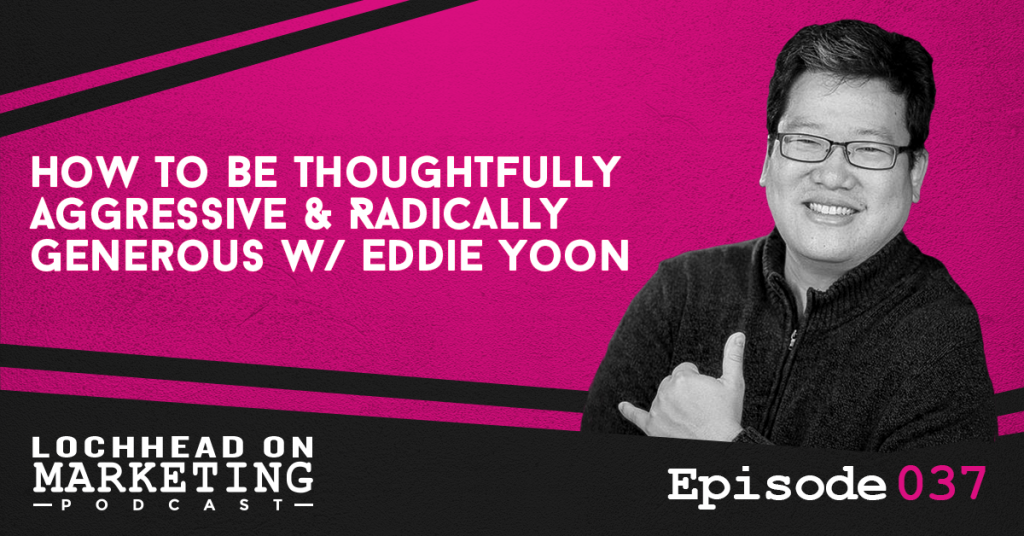
Podcast (lochheadonmarketing): Play in new window | Download (Duration: 1:09:36 — 47.8MB) | Embed
Subscribe: Apple Podcasts | Spotify | RSS | More
We have is a very special free form conversation with Eddie Yoon, author of Superconsumers. He is also the category design guru to the Fortune 500. Recently, we collaborated on an article for Harvard Business Review “5 Ways to Stimulate Cash Flow in a Downturn.”
In this episode, we bring that article to life as we talk about two big ideas: how to be thoughtfully aggressive and radically generous.
Innovations Through Adversities
Christopher and Eddie share some stories about what is currently happening in the US. Christopher acknowledges the fact that the figures during daily briefings are not just numbers, they are people who have friends, families, and relationships.
“I just feel deep sadness and concern right now for all small businesses and large businesses. I think a lot of innovations will come through it, as it always does in adversities but this is one of those I cant wait to be on the other side of it.” – Eddie Yoon
Thoughtfully Aggressive, Radically Generous
Christopher shares how they have been thinking and researching the book they are working on and how these two ideas started to resonate with people in this time of crisis.
“We have a unique opportunity now to be radically generous, best we can and that can be financially and thoughtfully aggressive. Some of our businesses are threatened. Most businesses are down in meaningful ways. As business leaders, we got to navigate through this the best we can.” – Christopher Lochhead
Eddie shares that in a time of uncertainty, we don’t know what is going to work. However, if we lean into being radically generous, and thoughtfully aggressive, we’ll be fine throughout this.
“When you’re in a crisis, you got to keep it simple and I think these principles are not that simple, but they are emotional. That’s the key part, cause sometimes in fight or flight, your brain doesn’t always work. Emotions are what you can hold on to and that’s something people can use to discern. Is it a radically generous thing or not? Am I being a chicken or should I be more thoughtfully aggressive about it?” – Eddie Yoon
No Best Time To Launch Than Now
For companies and brands who got caught up in the planning stage of launching a new product, Christopher and Eddie give advice that there’s no best time to launch than now.
“I think, that self-awareness is the thing that makes me feel comfortable. Category creation and design is the ultimate growth strategy. You should be doing it anyway.” – Eddie Yoon
To learn more about how to be thoughtfully aggressive and radically generous. and more information about Eddie Yoon, download and listen to this episode
Bio:
Eddie Yoon is the founder of EddieWouldGrow, LLC, a think tank and advisory firm on growth strategy. Previously he was one of the senior partners at The Cambridge Group, a strategy consulting firm.
His work over the past two decades has driven over $8 billion dollars of annual incremental revenue. In particular, 8 of his clients have doubled or tripled in revenue in less than 8 years.
Eddie is one of the world’s leading experts on finding and monetizing superconsumers to grow and create new categories.
He is the author of the book, Superconsumers: A Simple, Speedy and Sustainable Path to Superior Growth (Harvard Business School Press, 2016).
His book was named as one of the Best Business Books of 2017 by Strategy & Business. He is also the author of over 100 articles, including “Make Your Best Customers Even Better” (Harvard Business Review magazine, March 2014) and “Why It Pays to Be a Category Creator” (Harvard Business Review magazine, March 2013).
Additionally, he has appeared on CNBC and MSNBC and been quoted in The Wall Street Journal, The Economist and Forbes and has been a keynote speaker in the U.S., Canada, Kenya, Australia, New Zealand, Denmark, the UK and Japan.
Eddie holds an AB in Political Science and Economics from the University of Chicago. Having been born and raised in Hawaii, he went to the Punahou School in Honolulu. Eddie lives in Chicago with his wife and three children.
Links:
This episode is based on a Harvard Business Review article written by Eddie Yoon, & Christopher Lochhead.
155 4Star General Stan McChrystal: Crisis Leadership, Digital Business & Government, COVID19 & Advice for the US President
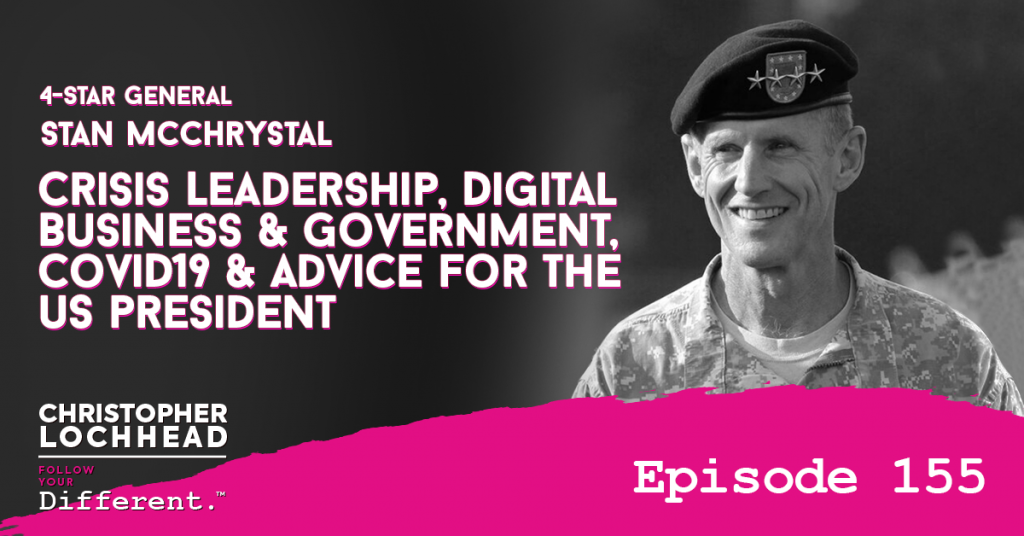
Podcast: Play in new window | Download (Duration: 1:03:19 — 43.5MB) | Embed
Subscribe: Apple Podcasts | Spotify | Pandora | RSS | More
Today, we have a legendary conversation with a legendary American Hero, retired 4-Star General, bestselling author, entrepreneur and educator Stan McChrystal. He is the partner of Chris Fussel who was recently on Follow Your Different Episode #149.
We get into these topics: leadership, digital leadership, crisis management, his view on how we got here with COVID19 and how we get out of it. We also discuss the digital divide between the public and private sectors and what we should do about, Pay special attention to The General’s advice for business leaders, State Governors and The President of The United States.
An Experience No One Predicted
Former Defense Secretary Robert Gates calls Stan “perhaps the finest warrior and leader of men in combat I ever met.” This was definitely one of the greatest descriptions one could say about him. He is the kind of leader any company would want in their team, especially during these unusual times.
Stan described this coronavirus pandemic as disorienting. It is highly different from most of the crises in our lives. We face an amorphous viral threat and we get affected economically as well/.
“So the average person is going through an experience he probably has never predicted. He got to get his mind around it and not just their own mind, but also their family, their organization and all the people they care about.” – Stan McChrystal
Leadership During Unusual Times
Aside from possessing leadership fundamentals, Stan calls for a different kind of leadership during these unusual times.
“Your organization can have had a strategy you’re very comfortable with that was executing in a set of places. Suddenly that strategy, for any number of reasons, appear to be absolutely invalid now. So the leaders got a role to first, give people a sense of direction and then provide direction. And finally, the leaders got to inspire.” – Stan McChrystal
On Digital Leadership
Christopher asked Stan about the daily video briefings he spearheaded when he was in the military and Stan gave a nice story back in memory lane. He was citing this as one of the best examples of digital leadership especially in times of crisis.
“Out of necessity, we spread our force. That was 2003 and then we realize, how do you synchronize that? We were at the beginning of the technological boom and we latched on the video conferences, laptops and we connected the entire force, every day, for 90 minutes. When I took command, it was 50 people for 30 minutes. Then we opened it to 7500 people for 90 minutes. To some people, it may sound like madness but it was the most efficient thing I’d ever been a part of,” – Stan McChrystal
To know more about the digital divide between the public and private sectors and what we should do about it and The General’s advice for business leaders, State Governors and The President of The United States, download and listen to this episode,
Bio:
Stan McChrystal is a retired 4-Star US General.
He is best known for his command of Joint Special Operations Command (JSOC) in the mid-2000s.
His last assignment was as Commander, International Security Assistance Force (ISAF) and Commander, United States Forces – Afghanistan (USFOR-A).[5] He previously served as Director, Joint Staff from August 2008 to June 2009 and as Commander of JSOC from 2003 to 2008, where he was credited with the death of Abu Musab al-Zarqawi, leader of Al-Qaeda in Iraq.
General McChrystal was awarded the Distinguished Service Medal by Army Chief of Staff Gen. George Casey and the Defense Distinguished Service Medal by Secretary of Defense Robert Gates.
General McChrystal founded McChrystal Group in January 2011 to deliver innovative leadership solutions to businesses globally in order to help them transform and succeed in challenging, dynamic environments.
Links:
My Share of the Task: A Memoir
Team of Teams: New Rules of Engagement for a Complex World
Wikipedia – Stanley McChrystal
We hope you enjoyed this episode of Follow Your Different™! Christopher loves hearing from his listeners. Feel free to email him, connect on Facebook, Twitter, Instagram and subscribe on iTunes!
154 Responsible Hyper-growth w/ Arisa Amano & Bob Remeika Co-founders Internal.IO
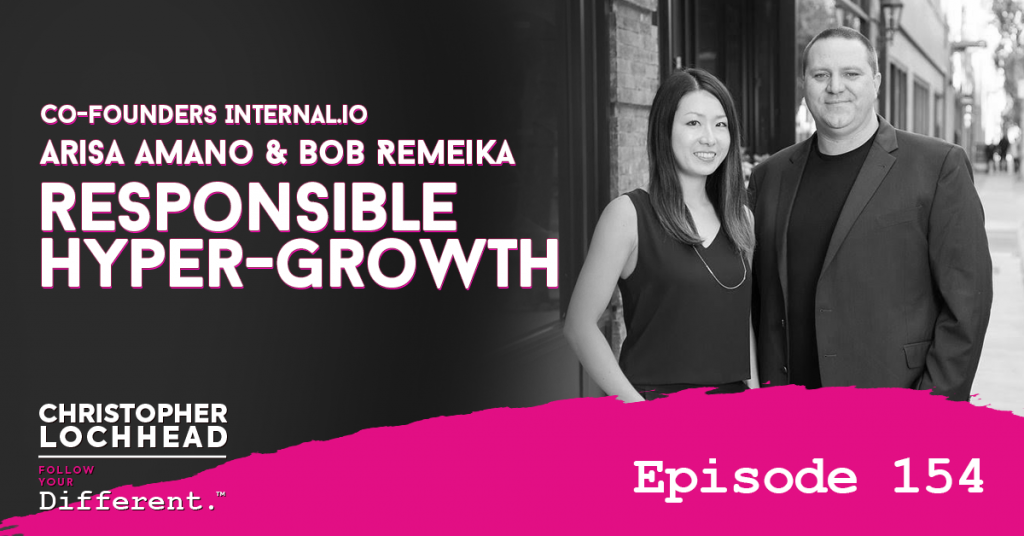
Podcast: Play in new window | Download (Duration: 38:54 — 26.7MB) | Embed
Subscribe: Apple Podcasts | Spotify | Pandora | RSS | More
In this episode, two mission-driven, Silicon Valley entrepreneurs Arisa Amano and Bob Remeika, co-founders of hot startup Internal.IO and they are on a mission to change Internal systems and productivity.
We have a real conversation about how technology can positively change the way work gets done, why is it important to protect customer data and how the two of them have built both their relationship and their company.
Internal.IO
Prior to co-founding the blockchain company Harbour, Anisa and Bob met at Yammer. They went ahead and launched Internal.IO when they realized that they have been building internal tools for different companies in the past.
“When Anisa and I were at Harbor, we realized we built this console internally and we look back and every other company that we’ve ever been at, we built internal tools for every single one. We started thinking about, what would be a good console and why do they get so bad?” – Bob Remeika
Access Abuse and More
Bob further shares their observation on why consoles are inefficient. Companies always try to determine where to allocate engineering resources and ideally, they should be working for the core product since it is vital to the business. He further shares that consoles often times becomes a “Frankenstein Project” or a hodgepodge of information.
“These internal tools are necessary but what happens is you always go with what is the common denominator. Building them? You usually zap them together and so, you wind up with something that is inherently insecure. You’re giving away way too much customer information to too many employees throughout your organization, so you’re subject to access abuse.” – Bob Remeika
Consoles or Internal Tools
Anisa shares that Internal. IO aims to replace the internal tools that companies built. She cites Uber as an example, where the main product is the ride-booking service. However, in the background, there are multiple departments that need to share information to be able to fulfill their jobs, such as Customer Service or Operations.
The concern, however, the console is either hard to use or the app does not have proper permissions in place to control the access or the app is partially broken and a lot of different issues because its not the core focus of the company. That is where Internal.IO comes in.
To know more about why it’s cool to disagree, how Anisa and Bob have built trust and to know their thoughts on responsible hyper-growth, download and listen to this episode,
Bio:
Arisa Amano began her career at VMware, a software company that provides cloud computing and platform virtualization software and services. As their marketing manager, she analyzed customer usage of products and created marketing campaigns; one of the campaigns was a YouTube video contest called “Run It with VMware.”
In 2010, she worked at MTV Networks as a Product Marketing Lead for Social Games. She worked across Nickelodeon, MTV, and Comedy Central groups.
In March 2011, Amano became the Director of Product Marketing & Design for Yammer. In December 2013, her role changed to Head of Lifecycle Marketing. She was part of the company until they were acquired by Microsoft.
In December 2014, Amano began playing the role of Vice President of Products for Zenefits. owned the complete relaunch of the Zenefits’ product suite, launching Z2 and HROne.
In 2017, Arisa Amano co-founded Harbor (blockchain) with Bob Remeika. Their team is in the process of creating a decentralized compliance protocol that standardizes the way securities are issued and traded on blockchains.
Bob Remeika is Co-Founder and CTO at Harbor, Inc.
Links:
We hope you enjoyed this episode of Follow Your Different™! Christopher loves hearing from his listeners. Feel free to email him, connect on Facebook, Twitter, Instagram and subscribe on iTunes!

